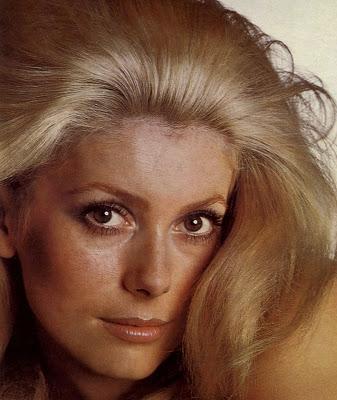
This is my first entry for the 2013 TCM Summer Under the Stars Blogathon now in progress and hosted by Jill Blake of http://sittinonabackyardfence.com/ and Michael Nazarewycz of http://scribehardonfilm.wordpress.com. Visit their sites for more information on the month-long blogathon and links to participating blogs.
In June 1965 the American magazine, Look, carried a feature entitled, "The Sister Stars of France" celebrating, with pages of pictures and a little hyperbolic prose, the Dorleac sisters of Paris. The piece commended their family which, "after only three generations in the theater, has given France not one, but two, gifted girls." The Dorleac sisters were Francoise, then 23, and Catherine, about to turn 22, who took her mother's maiden name, Deneuve, to avoid being confused with her sister. The "soignee" Francoise was described as "mistily delicious" in one of her recent films, That Man from Rio (1964), and "sweet" Catherine was pronounced "the crushable girl in a crushing world" in one of hers, The Umbrellas of Cherbourg (1964). Just two years later, in June 1967, Francoise perished in a car crash. By then, Catherine had added a twist or two to her pristine screen persona.
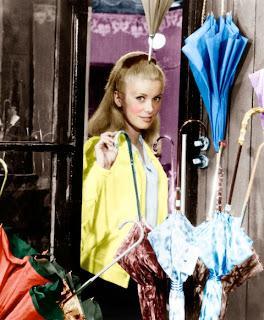
The Umbrellas of Cherbourg airs on TCM on August 12 at 8pm Eastern/5pm Pacific
The Look article had mentioned that Catherine's next picture was to be Repulsion. That film, directed by Roman Polanski and released in the U.S. in October 1965, showcased Catherine as a withdrawn young woman who goes violently psychotic while staying alone in her vacationing sister's London apartment. In 1967, she would make two noteworthy films. The Young Girls of Rochefort, a lollipop-colored musical, co-starred Catherine and her sister, Francoise, as a pair of dreamy twins longing to leave their seaside town for Paris; it was directed by Jacques Demy (The Umbrellas of Cherbourg). In her second feature of that year, Luis Bunuel's surreal and erotic Belle de Jour, the film with which she is most often identified, Catherine portrayed a refined young Parisian wife with a few psychosexual kinks.
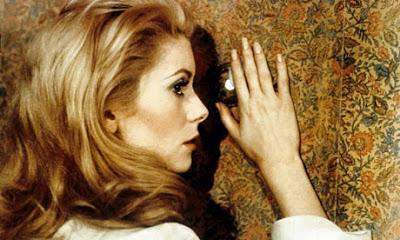
Belle de Jour airs on TCM August 13 at 2:15am Eastern/August 12 at 11:15pm Pacific
The Belle de Jour shoot was demanding. Catherine later recalled that she'd felt exposed in every way and that more of her had been shown, physically, than she had originally been led to expect. She was deeply unhappy on the set and, she remembered, "there were moments when I felt totally used." Francoise was still alive at that time and provided crucial moral support. The sisters were able to talk about her challenges on Belle de Jour, Catherine later said, "in the way you only can when you're personally close and do the same kind of work." It might seem surprising that Catherine agreed to work with Bunuel once more when he sought her two years later for his Freudian reverie, Tristana (1970). But she had been impressed with the script and thought it important for her to work with Bunuel again - especially in his native Spain. In the end, she would count Tristana among her favorites of her own films.
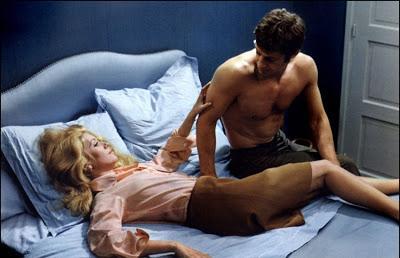
Mississippi Mermaid(co-starringJean-Paul Belmondo, shown above)airs on TCM August 12 at 9:45am Eastern/6:45 am Pacific
In the late 1960s Francois Truffaut sent Catherine a lengthy note urging her to "say yes to Hitchcock." During a trip to the U.S. in the fall of 1968, Catherine had met Hitchcock for lunch at the Plaza. It's likely they discussed his plans to make a film of The Short Night based on a novel of the same name as well as a non-fiction account by a double agent. Hitchcock owned the rights to both books and had traveled to Finland, where the story was set, in August 1968 to scout locations. Among those he hoped would star in the film were Sean Connery and Catherine Deneuve. She received a script from Hitchcock but the project was eventually abandoned when his health failed. Catherine lamented not having the chance to work with him but, thanks to Truffaut, she would have her moment as a Hitchcockian blonde.
In the same note in which he urged Catherine to work with Hitchcock, Truffaut also mentioned the project he and she were about to embark upon, Mississippi Mermaid (1969), the first of their two film collaborations. Mississippi Mermaid was also the last in a series known as Truffaut's "Hitchcock Cycle," the group of films he completed during the time he conducted and published his series of interviews with Alfred Hitchcock. Based on a Cornell Woolrich (Rear Window) novel, Mississippi Mermaid's storyline centers on a wealthy Reunion Island plantation owner (Jean-Paul Belmondo) and the arrival of his mail order bride (Deneuve) - who looks nothing like the picture she sent before she sailed to meet and marry him.
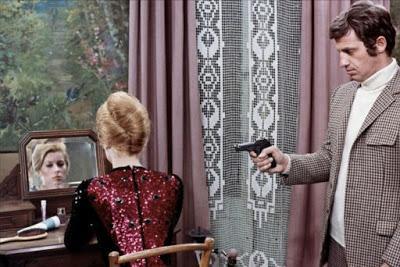
another French twist...
Catherine's wardrobe on Mississippi Mermaid was created by one of the great fashion designers of the 20th century, Yves Saint Laurent. He designed costumes for her on many films, beginning with Belle de Jour and including Jean-Pierre Melville's last film, Un Flic (1972), and Tony Scott's first feature, The Hunger (1983). The actress and the designer developed a close, lasting friendship; she wore his designs off screen as well as on and became his inspiration and muse.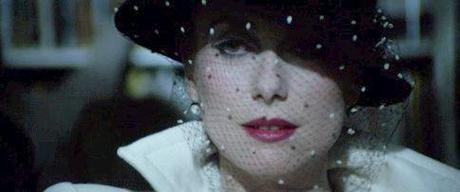
The Hunger airs August 13 at 4:15am Eastern/1:15am Pacific on TCM
With a body of work spanning 50 years and including more than 100 mostly European films, Catherine Deneuve has portrayed a wide range of characters on screen, expanding her repertoire (from sweet and innocent to beautiful and aloof to strong and independent) as her career progressed. She came, almost accidentally, to film acting through her sister and was initially admired primarily (and profusely) for her serene and impeccable porcelain beauty. Soon enough she was recognized for the depth and sensitivity of her work and, as her reputation flourished, she was able to pick and choose her roles - with several being developed expressly for her. In 1998, Catherine was interviewed on NPR's Fresh Air. She was intrigued by a quote the host read to her, the words of film critic David Thomson: "Deneuve is a fantastic actress, her beauty is a receptacle for any imagination, perhaps the greatest cool blonde, forever hinting at intimations of depravity." She was pleased, laughed lightly and remarked, with modesty, "I would like to meet the person he's talking about."
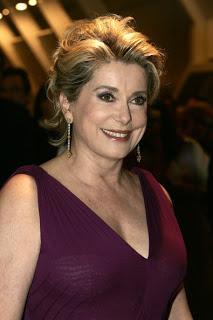
Catherine was awarded a Golden Palm at Cannes in 2005
Catherine Deneuve, was nominated for an Academy Award for Best Actress for her performance in Indochine (1992); she was nominated for a BAFTA for Best Actress for her performance in Belle de Jour; she was a winner, with her co-stars, of the Berlin International Film Festival's Silver Bear award for 8 Women (2002); she won two of France's Cesar awards for Best Actress - for The Last Metro (1980) and Indochine; and won the Volpi Cup prize for Best Actress at the Venice Film Festival for her performance in Place Vendome (1998). In addition, she has been honored with a multitude of special and lifetime achievement awards.TCM's Summer Under the Stars tribute to Catherine Deneuve is much deserved - and also well timed; on October 22, she will turn 70.
TCM's Summer Under the Stars, August 12: Catherine Deneuve(all times Eastern/Pacific)
6:00am/3:00am - Le Petit Poucet (2001), A fantasy/fairytale directed by Olivier Dahan
7:45am/4:45am - Repulsion (1965), directed by Roman Polanski and succinctly described by producer Robert Evans as a "really offbeat" thriller, it won the Berlin International Film Festival's Silver Bear honors as well as a directorial award for Polanski; in English
9:45am/6:45am - Mississippi Mermaid (1969), Francois Truffaut's Hitchcock-influenced mystery/thriller, with Jean-Paul Belmondo
12:00pm/9:00am - Un Flic (1972), cool and dark neo-noir directed by a master, Jean-Pierre Melville (Bob le Flambeur, Le Samourai), with Alain Delon and Richard Crenna
2:00pm/11:00am - Le Sauvage (1975), Jean-Paul Rappeneau's madcap romp, with Yves Montand, Tony Roberts and Dana Wynter
4:00pm/1:00pm - The Last Metro (1980), a wartime drama set in Nazi occupied Paris, directed by Francois Truffaut, with Gerard Depardieu; Oscar-nominated for Best Foreign Language Film and winner of 12 Cesar awards
6:15pm/3:15pm - I'm Going Home (2001), directed by Portuguese filmmaker Manoel de Oliveira; an exploration of mortality and the fourth film Oliveira made after the age of 90, with Michel Piccoli and John Malkovich; nominated for the Palme d'Or at Cannes
8:00pm/5:00pm - The Umbrellas of Cherbourg (1964), all dialog is sung in this innovative musical directed by Jacques Demy; winner of the Palme d'Or at Cannes; nominated for five Academy Awards including Best Foreign Language Film; Grammy-nominated for its score
10:00pm/7:00pm - Tristana (1970), Luis Bunuel's sadomasochistic dream, with Fernando Rey and Franco Nero; Oscar-nominated for Best Foreign Language Film
12:00am/9:00pm - Ma Saison Preferee (1993), Andre Techine's emotional, character-driven family drama features Catherine Deneuve and Daniel Auteuil as a conflicted brother and sister; with Chiara Mastroianni (Catherine's daughter with Marcello Mastroianni); nominated for the Palme d'Or at Cannes
2:15am/11:15pm - Belle de Jour (1967), one of Luis Bunuel's late-career masterpieces - about a bourgeois young wife with a secret life, with Michel Piccoli; winner of the Golden Lion and Pasinetti Award at the Venice Film Festival
4:15am/1:15am - The Hunger (1983), an ultra-stylish, dark and erotic vampire tale directed by Tony Scott, with David Bowie and Susan Sarandon; Scott's feature debut - his next film was the blockbuster, Top Gun (1986); in English
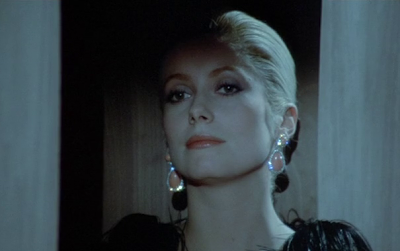
Un Flic airs on TCM August 12 at noon Eastern/9am Pacific
Notes:
Look magazine, June 1, 1965
Fresh Air on Stage and Screen, with Terry Gross (WHYY Inc., 2000)
The Guardian, Sept. 21, 2005; interview with Geoff Andrew at BFI/Southbank
The Private Diaries of Catherine Deneuve by Catherine Deneuve (Pegasus Books, 2007)

